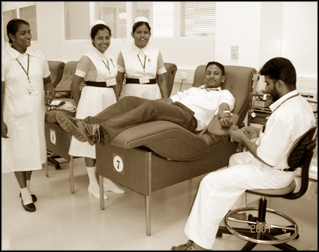Register with NBTS for 'SMS blood service'
by Ananda KANNANGARA
|

NBTS Director, Dr. Ananda Gunasekera
|
The National Blood Transfusion Service (NBTS) which is running under
the Ministry of Healthcare and Nutrition is rendering an excellent
service to the public in the country for over five decades.
The new NBTS headquarters at Narahenpita was opened in November 2006
and the country's first Blood Bank (The Central Blood Bank) was
established in the latter part of the 1950s at the General Hospital
premises in Colombo.
According to available reports, the first blood transfusion was done
on former Prime Minister S.W.R.D Bandaranaike in 1959.
In an exclusive interview with NBTS Director, Dr. Ananda Gunasekera
said, NBTS has been given the sole authority by the Health Ministry to
collect blood from donors and also distribute it for the use of patients
in Government and private hospitals.
"Since the requirement for blood has sharply increased day by day,
the Health Department was compelled to establish 15 cluster blood banks
and 60 other blood banks in Government hospitals countrywide.
Dr. Gunasekera also said that around 300,000 units of blood is
required annually to provide an adequate service to the people in the
country and this requirement was exceeded in some years, especially
during the year 2008.
"It was due to a large number of persons who were compelled to donate
blood for the sake of injured war heroes, who fought in the Northern
battlefront during that period," he said.
|

The bleeding room |
He said, at present four private hospitals in the country also obtain
blood directly from donors.
Asked how the NBTS distributes blood to other hospitals, he said when
a Government or a private hospital needs blood, they could obtain it
either from the NBTS headquarters, Narahenpita or any other blood bank
that is close to the hospital.
He said blood is not sold under any circumstances and it is issued
free.
"However, a nominal fee is charged from private hospitals in order to
cover the processing costs," he said.
Speaking further on the newly commenced `SMS Blood' service,
Dr. Gunasekera highly valued this service and said donors countrywide
who wish to donate blood could get themselves registered with the NBTS
via `SMS blood service'.
He said donors should not visit the NBTS for registration and they
could get it done by indicating the `blood' group in an SMS to 7777.
"When blood is required, the NBTS informs the donors via SMS.
"Although this is a new method in our country this type of programs
are currently conducted in many other countries very successfully," he
said.
"Thereafter the SMS gets stored in the database and the project staff
follows it by calling the registered donor and getting the necessary
information and updating it on the database,"
He said the project staff then arranges an appointment for the donor
to come and donate blood at any of the collection centres islandwide.
"In case a donor needs blood, then the project staff arrange that
facility too," he said.
When asked about the necessary criteria to donate blood,
Dr. Gunasekera said that donors who are between 18-60 years of age,
in good health and over 50 kg in weight could donate blood.
"Those who were infected with dangerous diseases such as HIV/ Aids,
hepatitis, Malaria or syphilis are not permitted to donate blood,"
He said persons with diabetes too could donate blood, unless the
patient controls the disease by drugs.
"However, the collected blood is once again examined at the NBTS
laboratories," he said.
He said in the past when patients needed blood, the required blood
was released after making a `Replacement Donation', but this system is
practised no more by the blood bank authorities due to adequate blood
stocks currently available in islandwide blood banks.
Asked whether the current stocks in blood banks are adequate to meet
emergency situations, Dr. Gunasekera said that there is no limit to
collect blood, if more and more donors wish to donate blood, the NBTS or
any other blood bank is willing to collect blood.
He also said 80 per cent blood is collected by conducting blood
donation campaigns at various places in the country and a large number
of social service centres are established in schools, offices and other
public societies to make the program a success.
Dr. Gunasekera further said a blood bank has already been established
in Chettikulam for the benefit of Internally Displaced Persons.
Dr. Senarath Jayasekara, Dr. Neetha Manthiratne, Dr.Lakmali Morawaka
and Dr. Anoja Herath also joined the discussion. |

